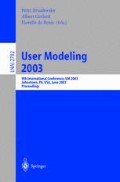Abstract
This paper describes our efforts at constructing a fine-grained student model in Project LISTEN’s intelligent tutor for reading. Reading is different from most domains that have been studied in the intelligent tutoring community, and presents unique challenges. Constructing a model of the user from voice input and mouse clicks is difficult, as is constructing a model when there is not a well-defined domain model. We use a database describing student interactions with our tutor to train a classifier that predicts whether students will click on a particular word for help with 83.2% accuracy. We have augmented the classifier with features describing properties of the word’s individual graphemes, and discuss how such knowledge can be used to assess student skills that cannot be directly measured.
Access this chapter
Tax calculation will be finalised at checkout
Purchases are for personal use only
Preview
Unable to display preview. Download preview PDF.
References
Beck, J.E., Jia, P. and Mostow, J., Assessing Student Proficiency in a Reading Tutor that Listens. Proceedings of the Ninth International Conference on User Modeling. 2003
Beck, J.E. and Woolf, B.P., Using a Learning Agent with a Student Model. Proceedings of the Fourth International Conference on Intelligent Tutoring Systems. p. 6–15. 1998
Dolch, E., A basic sight vocabulary. Elementary School Journal, 1936. 36: p. 456–460.
Hebb, D.O., The Organization of Behavior. 1949, New York: Wiley.
Jameson, A. and Wittig, F., Leveraging Data About Users in General in the Learning of Individual User Models. Proceedings of the Seventeenth International Joint Conference on Artificial Intelligence. p. 1185–1192. 2001
Jia, P., Beck, J.E. and Mostow, J., Can a Reading Tutor that Listens use Inter-word Latency to (better) Assess a Student’s Reading Ability? Proceedings of the ITS 2002 Workshop on Creating Valid Diagnostic Assessments. 2002
Langley, P., Iba, W. and Thompson, K., An Analysis of Bayesian Classifiers. Proceedings of the National Conference on Artificial Intelligence. p. 223–228. 1992
Lundberg, I. and Olofsson, A., Can computer speech support reading comprehension? Computers in Human Behaviour, 1993. 9(2–3): p. 283–293.
Mostow, J. and Aist, G., The Sounds of Silence: Towards Automated Evaluation of Student Learning in a Reading Tutor that Listens. Proceedings of the Fourteenth National Conference on Artificial Intelligence (AAAI-97). p. 355–361. 1997
Mostow, J. and Aist, G., Evaluating tutors that listen: An overview of Project LISTEN, in Smart Machines in Education, K. Forbus and P. Feltovich, Editors. 2001. Menlo Park, CA: AAAI. p. 169–234.
Mostow, J., Aist, G., Bey, J., Burkhead, P., Cuneo, A., Junker, B., Rossbach, S., Tobin, B., Valeri, J. and Wilson, S., Independent practice versus computer-guided oral reading: Equal-time comparison of sustained silent reading to an automated reading tutor that listens. Proceedings of the Ninth Annual Meeting of the Society for the Scientific Study of Reading. 2002
Mostow, J., Beck, J., Chalasani, R., Cuneo, A. and Jia, P., Viewing and Analyzing Multimodal Human-computer Tutorial Dialogue: A Database Approach. Proceedings of the Fourth IEEE International Conference on Multimodal Interfaces (ICMI 2002). p. 129–134. 2002
Mostow, J., Roth, S.F., Hauptmann, A.G. and Kane, M., A prototype reading coach that listens [AAAI-94 Outstanding Paper Award]. Proceedings of the Twelfth National Conference on Artificial Intelligence. p. 785–792. 1994
Webb, G.I. and Kuzmycz, M., Feature Based Modelling: A methodology for producing coherent, consistent, dynamically changing models of agents’ competencies. User Modeling and User Adapted Interaction, 1996. 8: p. 97–115.
Woodcock, R.W., Woodcock Reading Mastery Tests — Revised (WRMT-R/NU). 1998, Circle Pines, Minnesota: American Guidance Service.
Zukerman, I. and Albrecht, D.W., Predictive Statistical Models for User Modeling. User Modeling and User Adapted Interaction, 2001. 11(1–2): p. 5–18.
Author information
Authors and Affiliations
Editor information
Editors and Affiliations
Rights and permissions
Copyright information
© 2003 Springer-Verlag Berlin Heidelberg
About this paper
Cite this paper
Beck, J.E., Jia, P., Sison, J., Mostow, J. (2003). Predicting Student Help-Request Behavior in an Intelligent Tutor for Reading. In: Brusilovsky, P., Corbett, A., de Rosis, F. (eds) User Modeling 2003. UM 2003. Lecture Notes in Computer Science(), vol 2702. Springer, Berlin, Heidelberg. https://doi.org/10.1007/3-540-44963-9_41
Download citation
DOI: https://doi.org/10.1007/3-540-44963-9_41
Published:
Publisher Name: Springer, Berlin, Heidelberg
Print ISBN: 978-3-540-40381-4
Online ISBN: 978-3-540-44963-8
eBook Packages: Springer Book Archive

